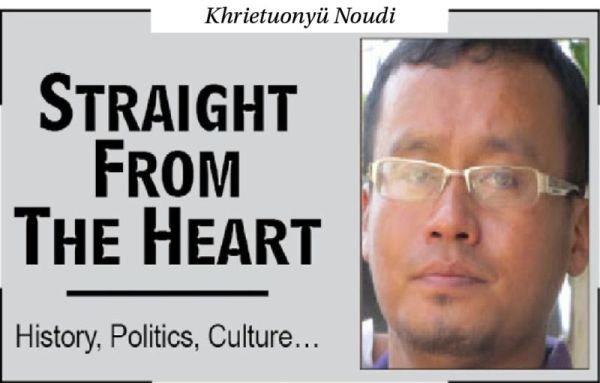
Ever since the Nagas submitted the Naga memorandum to the Simon Commission way back in 1929, the Nagas have been on a roller-coaster journey. Since that time, Nagas have been living in a milieu of hope, expectancy, aspiration, excitement, anticipation as well as apprehension not knowing what their future is going to turn out like. At times the Nagas would experience situation of total euphoria and ecstasy believing that at last their prayers were about to be answered and their aspirations about to be realized. But within no time these hopes and expectations would be dashed to the dust time and time again.
Some Nagas were taken to Europe by the British Imperial power to serve as laborers during the First World War. While rendering their service in faraway Europe during the Great War, these Naga laborers saw firsthand the disparity between themselves and others and political consciousness started brewing in their minds and hearts for the first time. Thus, the stories and ideas that they shared with their fellow Nagas upon their return back to Nagaland led to development of political awareness and consciousness amongst their peers as well. The sharing and spread of these stories and ideas led to the formation of the Naga club in 1918. And undoubtedly the submission of the Naga Memorandum to the Simon Commission was the most remarkable and outstanding work of the Naga club.
The submission of the Naga Memorandum to the Simon Commission led to the Nagas being left out of the Reform Acts of 1935. And from thereon the territories of the Nagas were treated as ‘excluded area’ outside the purview of the administration of British India. This is really a great and undeniable milestone in our political journey and it was a sure sign to one and all concerned that the Nagas were a distinct people from the rest of India and that their case needed to be handled carefully and differently. This was perhaps the first morale booster to the Naga aspiration for total freedom and independence. After this, the Nagas must have started feeling good thinking that their future is somewhat secure.
In the mid 1940s when the withdrawal of the British from the Indian sub-continent became eminent, the Naga leaders left no stone unturned to make it known to all concerned that they should not be thrown into the sea of Indian politics by the departing Imperial power. For this purpose, letters of intimation and appeal were submitted to both the outgoing British government and the incoming Indian government. But when positive responses were not forthcoming, the Naga leaders decided to meet the Great Man Mahatma Gandhi himself and apprise him of their situation and aspirations. And sure enough the Great Man did not disappoint the Nagas as he openly said that the Nagas had every right to be free and independent and he even said that he himself would come to the Naga lands and be shot before any Naga is ever shot. This was probably the second morale booster for the Naga political aspiration as they were sure that nobody would be able to ignore the beliefs and stand of the Great Man.
But everything turned upside down when the Great Man himself fell to an assassin’s bullets hardly seven months after the Naga delegation met him. With the Great Man gone, the political history and geography of India would be redrawn in a manner totally different from what the Great Man had promised the Nagas.
After the Second World War, the balance of international power also changed and the USA and the USSR became the two super powers and both these powers advocated for the freedom and independence of the third world countries. Moreover, the UNO was also established to ensure that no nation ever rule over another nation again and exploit its people and resources. The Nagas must have also seen all these events as being in their favor and believed that their political aspirations would be recognized sooner or later by the world.
The Nagas famously declared their independence on 14th August 1947, one day ahead of India’s own independence. But when India was not willing to acknowledge the independence of the Nagas, the Nagas decided to conduct a plebiscite to make it known once and for all the stand and aspiration of the Nagas. The result of the plebiscite conducted in May 1951 was an overwhelming 99.9 % in favor of total independence and sovereignty. This was probably the third great morale booster in the political journey of the Nagas because now everything was documented for all to see.
In our journey to be recognized as a distinct people, many Nagas had wished for some third country to intervene in this Indo-Naga conflict. And specially after the Indian army came into the Naga lands and started committing untold atrocities, we had always desired and wished for some international intervention. And so when our great leader landed in London in June 1960, many saw it as the first solid step towards procuring international support for our cause. Thus, the news of our leader landing in London was also a great morale booster for many Nagas because they were now almost certain that help and deliverance would come. But unfortunately that was not to be.
Clever politics played its part and the state of Nagaland was born in December 1963 as a result of the signing of the so-called 16 Point Agreement. Something noteworthy about this Agreement was that it placed Nagaland under the ministry of external affairs. I believe that this is extremely significant and speaks volumes because it implies that even India, in spite of all that it was saying and doing outwardly, knew that the Naga case was something external and foreign to India. For all those Nagas who could read and understand politics, this clause of the agreement in itself was again a great morale booster for our political aspirations.
But sadly enough, all our hopes were again dashed to the ground when the Indian government cleverly and unilaterally altered the agreement and transferred Nagaland from the ministry of external affairs to the ministry of home affairs. And thereafter Nagaland for most people became an internal matter of India.
At the time when the cold war was at its peak, both the USA and the USSR were doing its best to bring as many countries as possible under its fold. Thus when the communist ideology was about to engulf the whole of Vietnam, the United States was even outrageous enough to send thousands of its troops to Vietnam and let them perish in a faraway land fighting against a mere ideology. Likewise when Saddam Hussein occupied Kuwait, the whole world came to the rescue of Kuwait. In our political journey, most Nagas had always wished for some kind of international intervention and interference. But now it is amply clear that no super power is going to come from beyond the seas or mountains to fulfill our political aspirations and give us the so-called freedom and independence from a so-called bondage and foreign occupation of our lands.
So what are we supposed to do in such a situation? Though there has been no international liberation for us, that certainly does not make our rights and aspirations any less or inferior to the rights and aspirations of any people anywhere in the world. We may be a small people but our rights are still big, tall and strong and today we live in an era where ‘right is considered might’ and not vice versa. We have had our share of moments when we were sure that our prayers and aspirations would come true. But within no time all such hopes were made to bite the dust due to some strange twists of events, use of brute force and clever politics played on us. We have even been treated like dogs but our rights and aspirations continue to sparkle in the hearts of many.
Nobody can tell what the next tune and lyrics of the Naga Rhapsody would be like. For all Nagas born before 1985, we all grew up in a society where Naga freedom and independence was the hottest topic. But now, things have changed drastically and today we Nagas are confronted by gigantic issues like the unabated influx of immigrants into our lands, our lands being dissected into many parts, corruption, self-centered egos, greed, apathy towards pressing issues threatening our own existence and future etc. There may be even some who even doubt whether the voices we raised and the sacrifices we made to be recognized as a free people were worth it or not. But to those people, I would say that if not for those voices and sacrifices, we would today still be a hill district in Assam and making frequent journeys to Assam to meet all our needs.




